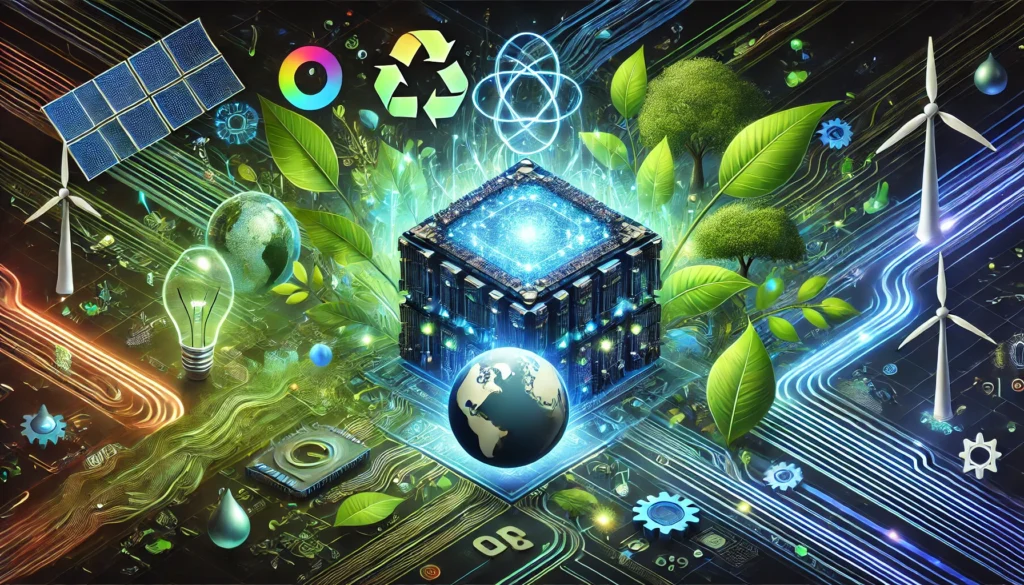Table of Contents
The world is on the brink of a new technological revolution: quantum computers. These machines, based on the principles of quantum mechanics, promise to solve complex problems faster and more efficiently than classical computers. While they pose significant challenges to data security, they also offer exciting opportunities for fostering sustainability. In this article, we delve into what quantum computers are, how they are transforming cryptography, and their potential role in creating a sustainable future.
What are quantum computers?
Quantum computers leverage qubits, which can exist in a state of superposition—meaning they can represent both 0 and 1 simultaneously. They also utilize entanglement, allowing massive amounts of data to be processed in parallel. This makes them vastly superior to classical computers for tasks like optimization, simulating chemical reactions, and factoring large numbers.
However, this capability also brings risks, particularly to the security of modern cryptographic systems, as we will discuss in the next section.
The threat of quantum computers to cryptography
Current encryption standards are built on mathematical problems that are difficult for classical computers to solve. Quantum computers, especially when employing algorithms like Shor’s Algorithm, could break these standards in mere minutes. The concept of “Harvest now, decrypt later” describes the danger of attackers storing encrypted data today, only to decrypt it in the future using quantum computers.
To address this threat, Post-Quantum Cryptography (PQC) and Quantum Key Distribution (QKD) are essential. PQC includes algorithms that can withstand attacks from quantum computers and can be implemented on classical machines. Lattice-based methods are particularly efficient, while code-based approaches offer high security, and hash-based techniques depend on the robustness of their underlying hash functions. On the other hand, QKD employs the physical principles of quantum mechanics, such as quantum entanglement, to create perfectly secure keys. This method ensures that any eavesdropping attempt is immediately detected, but comes with technical challenges like limited range and high infrastructure costs.
Quantum computing and sustainability
While quantum computers challenge the world of cryptography, they also hold immense potential for sustainable innovations. They can solve complex optimization problems, which can positively impact resource distribution. For instance, they could optimize power grids to minimize energy loss and better integrate renewable energy sources. In transportation, they could design more efficient routes, reducing greenhouse gas emissions.
In material and chemical design, quantum computers open new possibilities, such as simulating chemical reactions without expensive and time-consuming laboratory experiments. This could accelerate the development of more efficient batteries or effective methods for carbon capture. Similarly, they could enable more precise climate models that account for a greater number of variables, aiding policymakers in crafting more targeted measures against climate change.
However, there are challenges. Quantum computers require enormous amounts of energy, especially to cool qubits to near absolute zero. Additionally, they rely on rare materials like superconducting metals, which are resource-intensive to produce. Potential solutions include using renewable energy to power quantum data centers and developing more efficient cooling systems.
Combining crypto agility with sustainability
A sustainable adoption of quantum computers requires not just technological innovation but also the flexibility to adapt cryptographic systems. Organizations should proactively understand the risks posed by quantum computing and establish strategies for crypto-agile adjustments. This can involve systematically inventorying cryptographic dependencies, developing migration plans, and raising awareness among employees. Integrating quantum-secure measures into existing infrastructures can enhance both sustainability and security over the long term.
Policy framework for sustainability and security
Governments worldwide play a crucial role in promoting sustainable quantum research and ensuring robust security standards. Initiatives like Europe’s EuroQCI or Germany’s QuNET focus on environmentally friendly technologies and building quantum-secure communication infrastructures. International norms could ensure that quantum computers meet energy efficiency and resource-saving criteria. At the same time, educational and research programs must incorporate sustainability considerations into their development processes.
A challenge on two fronts
Quantum computers represent a technological revolution with two faces: they threaten our current security standards while offering new opportunities for sustainability and resource efficiency. To leverage these potentials and mitigate the risks, organizations and governments must work together. Early investments in quantum-secure cryptography, crypto-agile systems, and green technologies are critical to ensuring a sustainable and secure future.
Quantum computers have the power to change the world – if we use them responsibly.
Literature
- Quantum Computing and the Environment: How It Can Aid Sustainability: https://quantumzeitgeist.com/quantum-computing-aid-sustainability/
- Quantum Computing as a Driver of ESG Initiatives: https://www.pwc.de/en/digitale-transformation/quantum-computing/quantum-computing-as-a-driver-of-esg-initiatives.html
- Quantum Cryptography and Quantum Encryption Explained: https://scienceexchange.caltech.edu/topics/quantum-science-explained/quantum-cryptography
- Quantum Computing: https://www.iks.fraunhofer.de/en/topics/quantum-computing.html


